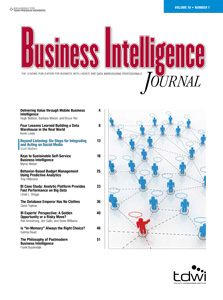
Business Intelligence Journal | Vol. 18, No. 1
TDWI Member Exclusive
March 18, 2013
It’s never too late to learn something new. This issue of the Business Intelligence Journal is loaded with lessons learned and new perspectives on many of BI’s hottest topics.
Senior editor Hugh J. Watson is joined by Barbara Wixom and Bruce Yen in reviewing the six lessons that GUESS, a designer clothing company, learned from its mobile BI efforts. As you’d expect, making applications speedy and providing support for bring-your-own-device are on the list, but there are some surprises as well.
As every schoolchild knows, you need the three Rs—reading, ’riting, and ’rithmetic— to get ahead in this world. To that I would add “reality”—as in learning from real-world experience. Kevin Lewis goes beyond a textbook’s broad concepts to explain the nuances he learned from building his own data warehouse. Lewis’s hands-on perspective will help you learn what makes a data warehouse project a success.
Speaking of keeping up with the times, Scott Walters understands how social media has changed the way people communicate and connect with each other. He explains the challenges of leveraging social media and lays out a six-step plan to help you get started.
One thing IT has learned is that users increasingly want to go the “do-it-yourself” route. That’s one reason why self-service reporting has become such a hot topic. Myron Weber will teach you the right way to provide such reporting using a unified design, targeted outputs, sound development practices, and active governance.
There are many more things to learn in this issue. Troy Hiltbrand explains his study of human behavior as managers dealt with budgets and how that knowledge was used to build a successful predictive analytics system. Our experts tell a job seeker what he needs to know before accepting a BI director position. Our case study explains how Merkle learned to deal with big data to create personalized marketing campaigns, and David Teplow details why relational databases aren’t suitable for handling big data. He describes the advantages Hadoop offers.
Katrina Read clarifies why “in-memory” technology isn’t always the right choice, and Frank Buytendijk explains why philosophy is so important in our fast-paced world of innovation.
What have you been learning? We welcome your feedback and comments; please send them to [email protected].
James E. Powell
Editorial Director
Business Intelligence Journal
IN THIS ISSUE
- Delivering Value through Mobile Business Intelligence
Hugh Watson, Barbara Wixom, and Bruce Yen
- Four Lessons Learned Building a Data Warehouse in the Real World
Kevin Lewis
- Beyond Listening: Six Steps for Integrating and Acting on Social Media
Scott Walters
- Keys to Sustainable Self-Service Business Intelligence
Myron Weber
- Behavior-Based Budget Management Using Predictive Analytics
Troy Hiltbrand
- BI Case Study: Analytic Platform Provides Fast Performance on Big Data
Linda L. Briggs
- The Database Emperor Has No Clothes
David Teplow
- BI Experts’ Perspective: A Golden Opportunity or a Risky Move?
Rob Armstrong, Jim Gallo, and Steve Williams
- Is “In-Memory” Always the Right Choice?
Katrina Read
- The Philosophy of Postmodern Business Intelligence
Frank Buytendijk